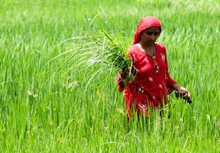
Agriculture has been the backbone of India's economy for centuries, providing livelihoods to a significant portion of its population. However, traditional farming methods have faced numerous challenges over the years, including unpredictable weather patterns, soil degradation, and insufficient yields.
In response to these challenges, modern farming methods have emerged as a promising solution to transform Indian agriculture. These innovative techniques, driven by technology and sustainable practices, are helping Indian farmers enhance productivity, reduce risks, and improve their overall quality of life. So, let’s explore the ways in which modern farming methods are benefiting Indian farmers.
-
Precision Farming
Precision farming, also known as smart farming, is a game-changer for Indian agriculture. It involves the use of technology, such as GPS-guided tractors and drones, to precisely manage resources like water, fertilizers, and pesticides. This method helps farmers optimize resource utilization, reduce waste, and improve crop yields. By analyzing real-time data, farmers can make informed decisions about when and where to plant, irrigate, and harvest their crops. This technology-driven approach not only boosts productivity but also minimizes environmental impacts.
-
Organic Farming
Modern Indian farmers are increasingly adopting organic farming practices. This method emphasizes sustainable and environmentally friendly techniques, avoiding synthetic chemicals and genetically modified organisms (GMOs). Organic farming not only produces healthier and safer food but also preserves soil fertility and biodiversity. Additionally, organic produce commands higher prices in the market, leading to increased incomes for farmers. This shift towards organic farming not only benefits the environment but also enhances the financial well-being of Indian farmers.
-
Greenhouse Farming
Greenhouse farming has revolutionized crop production in India. These controlled environments allow farmers to cultivate crops year-round, regardless of the weather outside. By carefully regulating temperature, humidity, and light, farmers can grow high-value crops like tomatoes, cucumbers, and bell peppers with fewer pest problems and higher yields. Greenhouses are particularly beneficial in regions with extreme weather conditions, providing stability to farmers' incomes and reducing the risk associated with climate variability.
-
Crop Rotation and Diversification
Modern farming practices encourage crop rotation and diversification, which help improve soil health and reduce the risk of pests and diseases. Instead of monocropping, where a single crop is grown repeatedly, farmers are now encouraged to rotate different crops. This approach enhances soil fertility and reduces the need for chemical inputs. Diversifying crops also provides farmers with multiple sources of income, reducing their dependence on a single crop and mitigating market price fluctuations.
-
Agri-Tech Solutions
The proliferation of smartphones and internet connectivity in rural India has given rise to a range of agri-tech solutions. Mobile apps and online platforms provide farmers with valuable information on weather forecasts, market prices, and best farming practices. These tools empower farmers to make informed decisions, reduce risks, and connect directly with buyers, eliminating the need for intermediaries and improving their bargaining power.
-
Sustainable Irrigation Techniques
Water scarcity is a significant concern in many parts of India. Modern farming methods promote sustainable irrigation techniques such as drip irrigation and rainwater harvesting. Drip irrigation delivers water directly to the plant's roots, reducing water wastage and increasing crop yields. Rainwater harvesting helps farmers collect and store rainwater during the monsoon season, providing a reliable water source during dry spells. These practices not only conserve water but also make farming more resilient to climate change.
Modern farming methods are transforming the agricultural landscape in India. These innovative approaches, driven by technology and sustainability, are helping Indian farmers overcome traditional challenges and improve their livelihoods. Precision farming, organic farming, greenhouse cultivation, crop diversification, agri-tech solutions, and sustainable irrigation techniques are just a few examples of the strategies that are reshaping Indian agriculture.
As these methods continue to gain popularity, Indian farmers are experiencing increased productivity, reduced risks, and enhanced well-being. The future of Indian agriculture is indeed looking brighter, thanks to these modern farming methods.












